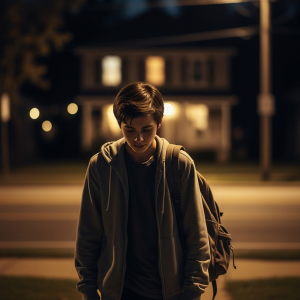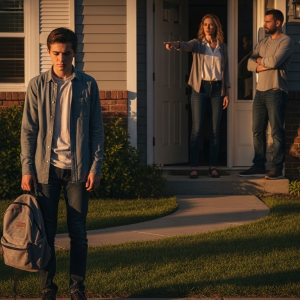My life split into a ‘before’ and ‘after’ when I was fourteen. The ‘before’ was a world where my biggest problem was algebra. The ‘after’ began on a Tuesday afternoon when my mom told me my dad had Stage 4 pancreatic cancer. He was the kind of man who always had a joke ready, even when he was so sick his favorite Chicago Bears jersey looked like a tent on his shrinking frame. The last thing he ever said to me was, “Don’t let your mom’s cooking kill you before I get back,” as they wheeled him to the hospital for the final time.
He died on a Thursday, which was supposed to be our deep-dish pizza night. I thought losing him would be the worst part of my life. I was wrong. The worst part was watching my mother replace him. She started dating two months later, a whirlwind romance with a wealthy real estate developer named Derek. Before I had even packed away my dad’s things, she was getting married in a lavish country club ceremony where I felt like a charity case in a junior bridesmaid dress I hadn’t even been asked if I wanted to wear.
After the wedding, they moved into Derek’s mansion in Newport Beach, a sprawling estate with a pool and a tennis court. But there was no room for me. My mom, with a breezy detachment that shattered me, said I’d be “more comfortable” living with my dad’s sister, Aunt Lisa, in Chicago. I was shipped off like an inconvenient piece of old furniture that didn’t match her new, glossy life.
Aunt Lisa lived in a huge, beautiful house in Lincoln Park with my Uncle Marcus and my cousins, Michael and Rebecca. We used to be close, but the moment I moved in, the dynamic shifted. I was no longer their fun summer cousin; I was a permanent, unwanted fixture. They treated me like I was a drain on their resources, a ghost haunting their perfect, privileged lives.
Rebecca would make snide remarks about my clothes. Michael would “accidentally” knock over my things. But Aunt Lisa was the most openly hostile. She made it excruciatingly clear I was a burden, going so far as to charge me rent while I was still in high school. It was a cold, transactional arrangement designed to remind me daily that I did not belong.
Meanwhile, my mother vanished from my life. She sent sporadic, insufficient payments for the “rent” and then went silent. My calls went to voicemail while her Facebook profile became a highlight reel of a life I was not part of—yacht parties in Europe, charity galas, romantic getaways with Derek. She even archived all the old family photos of me and my dad, claiming they didn’t match her “new profile aesthetic.” I had lost one parent to cancer and the other to a country club membership.
When Aunt Lisa hit me with a rent increase, citing “property taxes,” I knew I had to get a job. Rebecca, in a moment of feigned helpfulness, told me about a 24-hour laundromat hiring for the midnight shift in what she called a “sketchy” part of town. The owner, a grizzled old man named Jerry, hired me on the spot when I said I could start that night and wouldn’t complain about the pay.
My life became a grueling, surreal cycle. From midnight to 6 a.m., I was at the laundromat, a freezing, dilapidated building where the weirdest corners of the city seemed to congregate. From 7 a.m. to 2 p.m., I was a zombie at the local high school, trying to absorb lessons through a fog of exhaustion. Sleep became a luxury I couldn’t afford.
One job wasn’t enough to satisfy Aunt Lisa’s demands, so I started working at a gas station, the QuickStop, from 4 p.m. to 10 p.m. This became my cousins’ favorite new hangout. Michael and his friends would come in and systematically trash the store—toppling chip displays, spilling drinks, all with a casual cruelty that left me shaking with rage.
Rebecca’s torment was more insidious. She and her cheerleader friends would stand near the counter, talking about me as if I were deaf. “Oh my god, can you imagine having to work here? I’d literally die,” she’d say, loud enough for me to hear every word. They’d take humiliating photos of me cleaning their messes and post them online. Soon, kids at school were leaving quarters on my desk and calling me “Washer Girl.”
My grades plummeted. I was surviving on gas station coffee and sheer will. The only bright spot was Pete, a homeless man who frequented the laundromat. He was kind, showing me how to fix the broken machines and sharing stories that made me laugh for the first time in months. “Kid,” he told me one night, his eyes kind, “you’re living life on expert mode right now.”
Aunt Lisa kept finding new reasons to demand more money. Utilities, HOA fees, “prime real estate” for my converted basement storage room. I started stashing cash in an old teddy bear my dad had given me, dreaming of escape. But one day, I came home to find my room ransacked. The bear was torn open, its stuffing scattered across the floor. My savings were gone. Rebecca claimed she was just “cleaning.”
That same week, Aunt Lisa doubled my rent. It was an impossible sum. I had been taking a few classes at a community college, and I knew I had to make a choice: pay my aunt’s extortion fee or invest in my education. I chose education. I packed what little I owned into my rusty Toyota and left. For the first time since my dad died, I felt a flicker of control.
The first night in my car wasn’t so bad. I parked behind the laundromat, used my work keys to access the bathroom, and made a makeshift bed out of blankets from the lost and found. But then the real Chicago winter hit—a brutal, bone-chilling cold that made my car feel like a metal coffin. The battery kept dying, and I’d wake up with frost on the inside of my windows.
The hardest part was pretending to be normal. I was exhausted, perpetually cold, and smelled faintly of laundry detergent. My cousins, of course, figured it out. Michael followed me one night and soon, a TikTok series called “My Homeless Cousin: A Documentary” went viral among their wealthy friends. People started driving by the laundromat to honk and throw things at my car.
Through it all, I noticed a black SUV. It was always parked across the street, engine idling, windows tinted. I assumed it was a creep or an undercover cop, but it never approached. It just watched. One night, the temperature plunged to -15°F. My car wouldn’t start. My phone was dead. I wrapped myself in every piece of clothing I owned and genuinely thought, This is how I die.
That’s when a sharp knock echoed on my frozen window. It was Uncle Marcus, standing in the blizzard as if it were a spring day. “I think we need to talk,” he said, his voice calm and steady. It turned out the black SUV was his. He had been having his security team watch over me for weeks.
He took me to a small, private office above the laundromat I never knew existed. As I thawed out over a cup of coffee, he told me a story. He and my dad had grown up in abject poverty. He showed me an old photo of two skinny kids—my dad and him—eating beans from a can in the back of a van. They had been homeless, too.
The original owner of the laundromat had taken pity on them, and eventually, Uncle Marcus bought the place with his construction savings. It was his first property. He then showed me old business plans and contracts, all covered in my dad’s familiar handwriting. “When your dad got sick,” Uncle Marcus explained, “he made me promise two things. First, to look out for you. And second, to make sure you learned how to look out for yourself.”
He had been testing me. Watching me through the security cameras, reading Jerry’s work reports, even seeing the cruel TikToks. “They thought they were shaming you,” he said, his eyes intense. “All I saw was someone who refused to break.” He pulled out a key and told me it was for the studio apartment above his office. It was mine, rent-free, as long as I kept working and kept my grades up.
I tried to refuse, but he cut me off. “This isn’t charity. This is an investment. You have your father’s brains and your own kind of determination. I’m investing in that.” His last words that night were about my dad. “He made me swear not to just hand you everything. He said you needed to learn to be strong on your own first. But he also said to know when enough was enough. Kid, you’ve more than proved yourself.” I spent that night in a real bed, feeling safe for the first time in years.
The peace lasted less than twenty-four hours. Michael saw me leaving the apartment the next morning and, of course, took pictures. Soon after, Aunt Lisa stormed into the laundromat during my shift, a tempest in designer workout clothes. She started screaming, right there in front of the customers, accusing me of trying to steal her husband, of seducing him. The absurdity was staggering.
Jerry, my manager, had to threaten to call the police to get her to leave. That night, I heard them fighting in the office above me, Lisa’s muffled shrieks about “that girl” echoing through the floorboards. The next day, my mother called for the first time in months, her voice dripping with manufactured concern. “Honey, I’m hearing some disturbing things,” she began, as if she had any right to be disturbed.
Then she and Derek showed up at my tiny apartment, unannounced. My mother surveyed the small space with a look of distaste. “Oh, honey,” she said, her tone a mix of pity and calculation. “This is… quaint.” Derek hovered by the door, afraid poverty was airborne. “We’ve been hearing things about you and your Uncle Marcus,” my mom continued, a conspiratorial smile playing on her lips. “It’s clever, really. Getting close to him like this, playing the poor, abandoned niece.”
The implication hit me like a physical blow. “You think I’m trying to get his money?” I asked, my voice dangerously quiet. She laughed. “Well, aren’t you?” My own laughter bubbled up, harsh and bitter. “Obvious to who? You? The woman who shipped me off to Chicago and forgot I existed?” She tried to protest, but I cut her off. “You were upgrading! Trading up for a fancier life while I was working two jobs and sleeping in my car!”
Derek stepped forward then, all fake authority. “Now listen here, young lady. Your mother and I are concerned about your welfare.” “My welfare?” I shot back. “Where was this concern when Aunt Lisa was extorting rent from me? Where were you when I got bronchitis from sleeping in a freezing car?” My mother waved her hand dismissively. “Don’t be so dramatic.”
“You want to talk about dramatic?” I challenged her. “Go archive some more family photos because they don’t match your aesthetic, then come back and talk to me about my welfare.” Her face hardened, the concerned mother act dissolving completely. “Marcus was your father’s brother. Anything of his should go to me.” “His ex-wife,” I corrected, “who remarried less than a year after he died.”
“Get out,” I said, pointing to the door. “Go back to your perfect life and your charity galas.” They finally left, my mother muttering about my ingratitude. As the door closed, I heard her say to Derek, “I told you this would happen. That little gold digger is going to try to take everything.” I slid down against the door, my body trembling with rage.
A week later, Michael burst into the laundromat, his face pale with terror. He had been using his mother’s iPad when a message popped up from a contact saved as ‘D.’ “Everything’s ready for next week,” the message read. “Lisa, baby, we’re finally going to be free.” Michael, being a nosy teenager, opened the messages. ‘D’ was Derek. My stepdad. My mom’s husband.
They had been having an affair for months. The iPad contained a treasure trove of their conspiracy: emails, secret bank accounts, and a detailed plan to embezzle millions from Uncle Marcus’s business and disappear together. Every time Aunt Lisa had raised my rent, that money had gone directly into their escape fund. For the first time, I saw genuine fear in my cousin’s eyes. His own mother was about to rob him blind and abandon him.
I called Uncle Marcus immediately. When he saw the messages, his face became a blank, emotionless mask. He called his lawyer, who confirmed he’d had suspicions about certain accounts for months. An emergency audit revealed the horrifying truth. They were planning to steal $4.3 million. They had already funneled nearly a million into offshore accounts. Some of that money had come from Michael and Rebecca’s college funds.
While this financial earthquake was happening behind the scenes, Lisa and Derek continued their charade. She posted workout selfies; he took my mom to fundraisers. But Rebecca found the messages on the iPad, too. She showed up at my apartment one night, a sobbing, mascara-streaked mess. The girl who had mocked me for being homeless was now effectively homeless herself, unable to bear being under the same roof as her mother. It was a strange, sad form of justice.
She slept on my tiny futon, wearing my cheap clothes, and apologizing over and over. But watching her world crumble was apology enough. The lawyers advised us to wait, to gather more evidence. The plan was to catch them in the act. But Lisa must have sensed something was wrong, because she started moving money faster. The final confrontation was set for the perfect, unsuspecting stage: Michael’s 18th birthday party.
The morning of Michael’s birthday was thick with a surreal tension. Aunt Lisa was a whirlwind of activity, arranging flowers and directing caterers, all while planning her escape. Rebecca and I helped set up, exchanging nervous glances, trying to act normal. Michael looked physically ill every time his mother hugged him. The plan was simple: the lawyer would arrive mid-party with “urgent paperwork,” and the FBI would be waiting nearby.
My mom and Derek arrived, all smiles and expensive gifts, completely oblivious. The party began, a picture of suburban opulence. But beneath the music and laughter, a storm was brewing. At 4 p.m., the lawyer arrived. The look of pure panic on Aunt Lisa’s face when she saw him was something I’ll never forget. He gathered the “family only” into the living room.
Then, he began. He laid out bank statements, emails, and photos from a private investigator on the coffee table. With each new piece of evidence, the air grew colder. He played a recording of Lisa and Derek laughing about how stupid everyone was. My mother froze, her hand flying to her mouth as she heard Derek’s voice, full of casual betrayal.
Aunt Lisa tried to deny it, but Uncle Marcus calmly began reading her texts with Derek aloud from the iPad. All hell broke loose. My mother launched herself at Derek, beating him with her designer purse. Aunt Lisa made a break for the door, but two FBI agents were already there. They were both arrested, handcuffed amidst the remnants of a birthday party. Neither of them even looked at their children.
My mom had a complete breakdown. It turned out Derek had been stealing from her, too, draining the last of my dad’s life insurance money. The next few weeks were a blur of investigations and revelations. The plot was even more extensive than we’d imagined—fake passports, shell companies, stolen charity funds. Their greed knew no bounds.
In the wake of the arrests, our lives were thrown into chaos, but something unexpected began to emerge from the wreckage. Rebecca and Michael effectively moved in with me, our tiny apartment becoming a strange, cramped refugee camp. We created a new kind of family, forged in betrayal and bonded by a shared, bizarre trauma.
They both got jobs at the laundromat. Rebecca, stripped of her privilege, discovered a surprising talent for customer service. Michael found his calling fixing the complex machinery, his hands as nimble as his mind. They were learning the value of work, of earning their place in the world. My mom entered a rehab facility—not for addiction, but for a complete psychological breakdown, forced to confront the empty life she had built on a foundation of lies.
Uncle Marcus stepped up, becoming the father figure we all desperately needed. He began teaching the three of us the business, from the ground up. He saw our potential as a team: my head for numbers, Rebecca’s skill with people, and Michael’s mechanical genius. “Your dad helped build all of this,” he told us one day. “Now it’s your turn to carry it on.”
Aunt Lisa and Derek are in prison now, their lavish future replaced by a concrete cell. They spend their days blaming each other, a fitting end to their toxic partnership. Last week, the four of us—me, Uncle Marcus, Michael, and Rebecca—visited my dad’s grave together. As my uncle told stories of their shared past, I realized the truth. My old family was gone, destroyed by greed and lies. But in its place, something new and far more real was beginning to grow.




